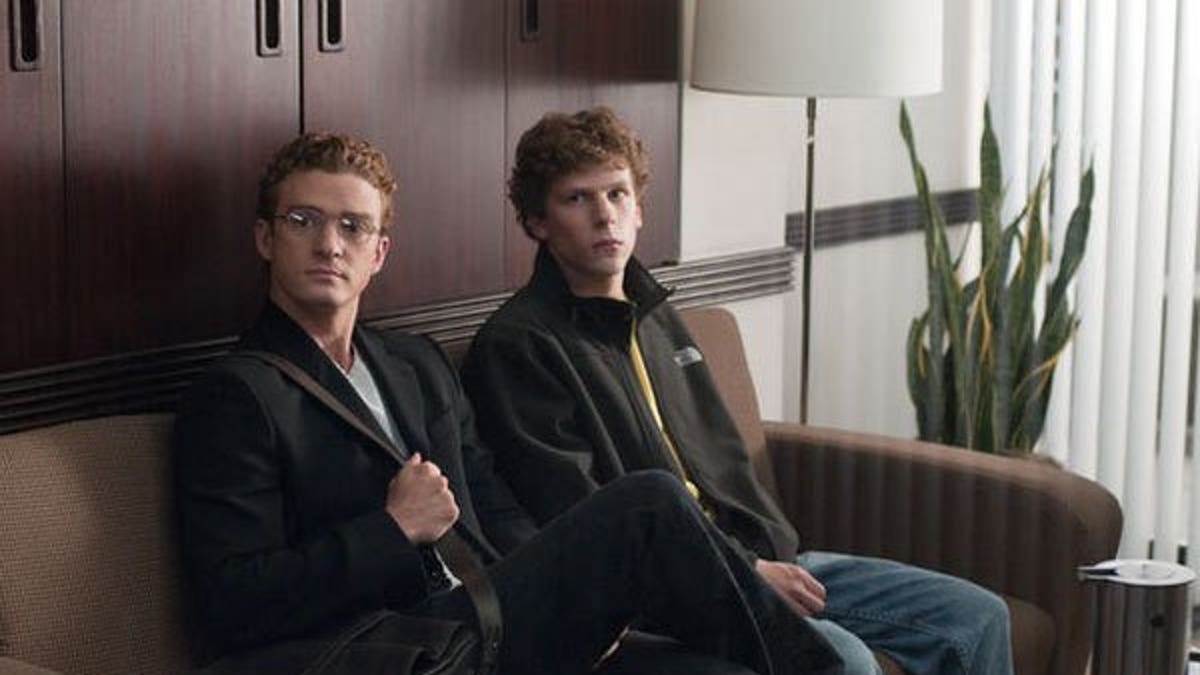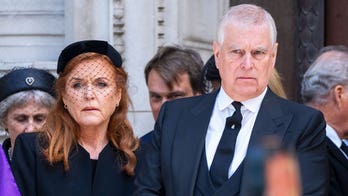
Justin Timberlake and Jesse Eisenberg in 'The Social Nework.' (Columbia)
The tsunami of effusive praise has been gathering force about “The Social Network.” By the beginning of September, it was being crowned the best movie of the year, the decade, the century – the best ever made! – in a lot of overheated reviews on the Internet and elsewhere.
Allow me to demur a little and call that assessment premature.
Not that I don’t think “The Social Network” is a fine movie and certainly one that probably will be on my Top 10 list at year’s end. It’s smart, funny, well-acted and trenchant. But I have this funny tendency: I’d rather size up all of the films of the year before proclaiming one the absolute best. Call me cautious, but there you are.
And while I have enjoyed and admired the work of director David Fincher in the past, I’m not quite ready to put him in the pantheon, as it were. Given the remarkably literate, incisive – and witty – script by Aaron Sorkin, even the worst director would have been hard-pressed to make a bad movie out of this material. Fincher has cast it well and obviously understands how to tell the story – but I can think of at least a half-dozen under-sung directors currently working on both studio and independent films who could have hit this one out of the park.
------------------------------------
REVIEWS: All September 2010 Films.
REVIEW: 'Waiting for Superman.'
------------------------------------
That said, “The Social Network” satisfies in ways great and small, as it tells a small story with big implications. In this fictionalized but semi-fact-based tale about the creation of Facebook, being smart will take you a long way, but never as far as you’d like.
That’s certainly true of Mark Zuckerberg (Jesse Eisenberg), a socially maladroit Harvard sophomore computer nerd who, in the opening scene of the film, buzzily delineates his single-minded quest to be recruited by one of Harvard’s elite social clubs, over beers with his girlfriend (the protean Rooney Mara). She breaks up with him on the spot after he casually insults her and he gets even by flaming her on his blog.
A little drunk, he goes even further, creating a hot-or-not style website of Harvard women that allows anyone on the web at Harvard to vote on the cuter of two faces. It spreads like wildfire, creating so much Internet traffic that it crashes Harvard’s servers.
As written by Sorkin and played by Jesse Eisenberg, Zuckerberg is a character who is, by turn, diffident, icy and blunt. He’s a computer whiz, obviously, though his social circle is confined to a few other computer geeks with whom social niceties aren’t paramount. They become his inner circle when he gets the idea for Facebook.
Or does he? He is approached by a pair of twin preppies from Connecticut, Tyler and Cameron Winklevoss (both played by actor Armie Hammer) – two privileged types who row crew and have the Olympics in their sites. Indeed, they are like minor Harvard gods, representing all the things that Zuckerberg desires but which seemingly are beyond his grasp: wealth, status, strapping physicality, golden good looks.
Aware of Zuckerberg’s reputation for computer wizardry, they propose teaming up to create a Harvard-centric dating site, Harvard Connection. They’ll pay him to build the site and offer him a share of the profits.
Zuckerberg, however, has a brainstorm of his own: Why not create a social network that goes beyond dating, one that allows people at the same college to post information about themselves and seek and make friends online?
Before the Winklevosses know what’s happening, Zuckerberg has created The Facebook (later shortened to simply Facebook). When it proves to be a sensation at Harvard, Zuckerberg and his partner (and underwriter) Eduardo Saverin (Andrew Garfield) expand to other Ivy League schools and Stanford.
Facebook, in the parlance, goes viral, growing almost exponentially. Zuckerberg and Saverin clash about how to monetize it, with Saverin trying to sell ads and Zuckerberg looking instead for venture capital to back it. Eventually, he connects with Sean Parker (Justin Timberlake), the creator of Napster, who rubs Saverin the wrong way but appeals to hubristic side of Zuckerberg in his vision of what Facebook could be.
All of this is rendered in semi-linear fashion, though probably four-fifths of that is in a flashback structure. The central characters tell it during dueling depositions for the various lawsuits that rain on Zuckerberg after he methodically undercuts or otherwise screws his various partners. It’s a little confusing at first, because Fincher casually intercuts between interrogations from two different depositions – the one from the suit by the Winklevosses and the one from the suit by Saverin. You can tell them apart by the difference in wardrobe worn by Zuckerberg and other characters who show up in both sequences.
The meat and potatoes, of course, is the story itself, unfolding at the midpoint of the 21st century’s first decade. Zuckerberg is portrayed as socially inept; if he were a dog, they’d have to pin a porkchop to his collar to get the other dogs to play with him. In his case, his sudden magnetism has to do with his rock-star computer-geek status and the money that went with it.
Ultimately, what Fincher – and, more importantly, Sorkin – are saying is that, when someone tells you, “It’s not personal – it’s business,” well, if you had a personal relationship first, then it is personal. And that stuff stings. But Zuckerberg is portrayed as such a closed-off personality, someone so used to social rejection, that screwing his friends doesn’t seem like transgression – just logical. Mr. Spock as college computer geek.
I’ve already read comparisons between this version of Zuckerberg and Orson Welles’ Charles Foster Kane, a fictionalized version of William Randolph Hearst. Ultimately, what “The Social Network” shares with “Citizen Kane” is its ability to tell a big story by focusing on a single personality – in both cases, someone who thinks popularity and love can be bought if you have enough money and success and who, painfully, learns otherwise.
As for Facebook as metaphor, well, what do social networks like Facebook say about our times? Are they just another indication of the fragmentation of both society and social communication? Is Facebook a good thing or a bad thing? A necessary thing? Well, honestly – is there a wrong answer to any of these questions?
It’s certainly a generational thing – in the same way that many people divide cultural history based on the periods pre- and post- the arrival of the Beatles. If you try to ignore Facebook, Twitter and the rest, it marks you in the same way as, a few years ago, hearing someone say, “Oh, I don’t do e-mail.”
Eisenberg, Garfield and the rest are outstanding – so is Timberlake, whose Parker plays Mephistopheles to Zuckerberg’s Faust. They have an energy, a vitality and a sense of mission that brings “The Social Network” to life.
But make no mistake – while David Fincher directed it, “The Social Network” is Aaron Sorkin’s film. His writing is what truly sings here. It’s not just good compared to the middling writing that floods movie theaters these days – it’s great in the broadest historical sense as well. Among many pleasures, that writing is a key reason to see – and enjoy – “The Social Network.”
-- Marshall Fine is a movie critic, author and journalist who publishes the website Holywoodandfine.com.














































